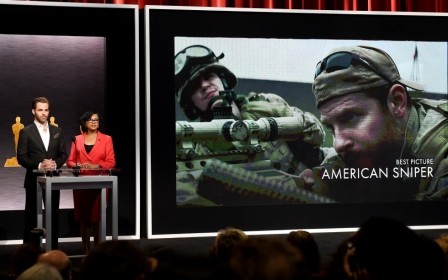A tale of two Snipers: The Eyes of a Thief vs American Sniper
Clint Eastwood’s film American Sniper has made global headlines, and sparked heated debate, while Palestinian filmmaker Najwa Najjar’s Eyes of a Thief - also about a wartime sniper - remains relatively off radar.
But the two films - one the un-nominated Palestinian entry for the Oscars, the other a multiple Oscar nominee - make for an interesting study in perception and reality.
Both have been controversial in their own way, and both appear to lionise their protagonists as “heroes” - one for shooting over 125 Iraqi “savages” during the American occupation of Iraq - and the other for taking out 10 Israeli soldiers at an army checkpoint guarding a settlement next to the West Bank town of Silwad during the second intifadah. (Eyes of a Thief is the name of a valley between Nablus and Ramallah so named because of the robberies that used to occur there. Once home to British army barracks, it’s now the site of a permanent Israeli army checkpoint). Both films are based on real-life events adapted for the cinema.
American Sniper was inspired by Chris Kyle’s autobiography - which some say is already rather embellished. Najjar, who also wrote the screenplay for her film, took the 2002 incident at Silwad in which 22-year-old Thaer Hamad (who, like Chris Kyle, honed his shooting skills on childhood hunting trips and who became a Palestinian legend in his own right) shot the soldiers - and cinematised it. She made her sniper protagonist a Christian, whose Israeli army-inflicted wounds are treated by nuns and priests before he is captured by the Israelis, and throws in a love interest (Algerian singer Souad Massi as Lila) and a quest to find a missing daughter( a plucky Nisreen Faour as Duniya)
What is heroism?
But how should “heroism” be defined in the context of war and occupation? And who are the real heroes? Men with guns? Or the women and children who defiantly attempt to survive the daily struggle?
And how does point of view influence film viewers? Can new Palestinian media like Eyes of a Thief help Western viewers change their perceptions about Palestine? Or is cultural identification too powerful to overcome?
Does the extreme stereotyping of American Sniper represent a new Hollywood low, or is it simply a continuation of the classic war movie genre that dehumanises the “enemy”?
After the screening of Eyes of a Thief I took in at the Palm Springs International Film festival earlier this month, several disgruntled Americans left the theatre in disgust, saying: “This kind of thing should not be glorified.” I wonder if their reaction would have been the same to American Sniper?
While Najjar is a young second-time filmmaker, and Eastwood is a veteran, both have faced controversy and perhaps unfair accusations of “glorification” of violence. Many right-wing Americans seem to have taken Eastwood’s film literally, but on one level it can be read as an anti-war film that questions the madness of the Iraqi adventure, or at least as a catalyst for reflection upon it.
Taboo of the collaborator
Najjar faced internal criticism in Palestine for a previous film (2008’s Pomegranates and Myrrh), in which the wife of a prisoner contemplates - but does not consummate - an affair with another man, and has been accused by some Israelis of “glorifying” violence against occupying soldiers. In Eyes of a Thief she dares to confront the taboo subject of the collaborator – in the character of Adel, the local corrupt businessman who does dirty deals with the Israelis, diverting Palestinian water to a nearby settlement.
And yet, as Adel reminds the townspeople when his collaboration is revealed, he’s still the one everyone came to when they needed a permit, a job or a favour.
American Sniper approaches a few moments of similar self-awareness – like when the dead-eyed, shell-shocked Chris Kyle rambles on to his bewildered wife about the superficial life of “malls and cell phones” in the midst of a war that no one talks about. And as Noam Chomsky recently implied, Obama’s current drone wars render most of his countrymen as complicit as “American snipers”.
With Shin Bet still one of the biggest employers in the West Bank, Najjar’s collaborator character also rings true.
The points of resonance don’t end there. In fact, when I first saw Eyes of a Thief, (prior to watching American Sniper) it reminded me of an Eastwood in Palestine movie. Like Chris Kyle as portrayed by Bradley Cooper, the sniper-hero Tarek (played by Egyptian heartthrob Khaled Abol Naga) is a lone gunslinger hell-bent on justice and revenge, a man of few words, haunted by his past.
In the climactic scene, he jumps from a balcony onto the wedding horse of corrupt groom Adel, preventing him from marrying Lila and exposing his collaboration to the assembled townsfolk in a dramatic fell swoop.
But his final gesture of defiance - destroying the water main he unwittingly helped divert to an Israeli settlement - is more Wounded Knee than High Plains Drifter. As Adel wryly notes, one water main won’t make much difference to an increasingly shrinking Palestinian territory.
Still, it’s a fine populist moment of genuine heroism - and I’m sure it elicited cheers from Palestinian audiences. The final scene, a flashback to the moment 10 years earlier when Tarek shoots the soldiers with his grandfather’s rifle, conveys more ambivalence.
One a hero, the other jailed
While the two sniper films are quite different in their execution - Najjar’s film explores Tarek’s relationship with Lila and his daughter, and the toll occupation takes on women and children - while Eastwood’s is much more war buddy flick - a certain realpolitik also separates them.
While Chris Kyle was celebrated as a hero and decorated by the military, Thaer Hamad is still rotting in an Israeli jail, along with thousands of other Palestinians, where he is serving 11 consecutive life sentences.
In the end though, the films made me reflect on the senseless violence of both occupations. The context so sorely lacking in American Sniper speaks volumes: thousands of American soldiers and hundreds of thousands of Iraqis lost their lives after a client regime was overthrown in an illegal invasion that turned former CIA asset Abu Musab al-Zarqawi into the al Qaeda in Iraq bogeyman who “justified” the pulverising of towns like Falluja, (including the use of white phosphorous), encouraged the fomenting of violent sectarianism and paved the way for the likes of Islamic State.
And some 13 years after Thaer Hamad shot those 10 Israeli soldiers – as distant and dehumanised in Eyes of a Thief as Iraqis were in American Sniper - illegal settlements continue at an unprecedented rate, and Fatah works with Shin Bet and the CIA on “internal security” issues.
Meanwhile, I long for a film – Hollywood or otherwise - that eschews the lone gunslinger point of view in favour of a war widow heroine, raising her kids in a Baghdad slum, or a Gazan mother struggling to survive the winter in a bombed-out shell of her former home.
After all, true heroism deserves its due.
- Hadani Ditmars is the author of Dancing in the No-Fly Zone: a Woman's Journey Through Iraq, a past editor at New Internationalist, and has been reporting from the Middle East for two decades.
The views expressed in this article belong to the author and do not necessarily reflect the editorial policy of Middle East Eye.
Photo: Eyes of a Thief stars Egyptian actor Khaled Abol Naga
New MEE newsletter: Jerusalem Dispatch
Sign up to get the latest insights and analysis on Israel-Palestine, alongside Turkey Unpacked and other MEE newsletters
Middle East Eye delivers independent and unrivalled coverage and analysis of the Middle East, North Africa and beyond. To learn more about republishing this content and the associated fees, please fill out this form. More about MEE can be found here.




